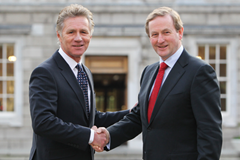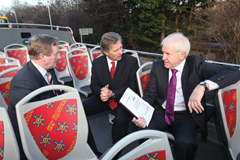Fine Gael’s Eamonn Coghlan
 Former world athletics champion, now Fine Gael Senator, Eamonn Coghlan talks to Stephen Dineen about life in Seanad Éireann and the potential from sport for the country’s health and economy.
Former world athletics champion, now Fine Gael Senator, Eamonn Coghlan talks to Stephen Dineen about life in Seanad Éireann and the potential from sport for the country’s health and economy.
Like all athletic champions, Eamonn Coghlan knows about pacing oneself. “The advice I got from quite a lot of people,” he says of Seanad life, after being appointed by the Taoiseach last May, “was to identify one or two areas that you really believe in and that you have a passion in and don’t get caught up in all the other issues.”
Coghlan has firstly focused on the area of children’s physical fitness. “We’re facing a tsunami here,” he says. “The research tells us that the kids are getting nothing when they get home from school: not being fed right, not being looked after right, not getting enough exercise.” These children are “the ones who have got obesity, type two diabetes, haven’t got an understanding of motorary skills, who don’t have the cardio-vascular understanding.”
Last year Coghlan produced a report on physical fitness and education in Irish schools that indicated that the physical education curriculum is not being implemented in full in 65 per cent of schools (just 37 schools completed the survey). The Senator believes this primarily arises for three reasons: the emphasis on literacy and numeracy in primary schools, “lack of facilities” and teachers’ lack of confidence “in implementing the curriculum.”
The report was the basis of a motion he brought to the Seanad on 23 November last year. The Government agreed to explore options for developing a continuously assessed physical fitness and health awareness programme with regular, corresponding health checks.
In the short term, Coghlan wants to achieve cross-departmental co-operation, well monitored exercise programmes for 15 minutes every day, and fitness diaries for children.
In the medium term, he wants fitness interns employed in schools and a physical fitness programme to be a core school subject. The long-term goal is improved health for the next generation, less financial pressure on the health services and Ireland’s health education leading by example.
“You can win a debate but you’ve got to try now and get some action as a result,” he says, but Coghlan seems pleased that his first two short-term objectives have been met. Departments are co-operating and he has established a working committee comprising representatives from five departments (Health, Education, Agriculture, Children and Transport) and from the medical, academic and physical education fields. He is currently working “with the view to implementing something at primary school level come September.”
A second priority area for Coghlan is tourism and sport. “I have a very good feel and a good eye for tourism promotions and opportunities, so we’ll deal with that another day,” he says, explaining that working for Bord Fáilte in America whilst also an athlete taught him that sportspeople “represent Ireland in a very, very positive way abroad, through the medium of their great successes.” On linking what he learnt in the 70s and 80s with now, he adds: “I see an opportunity there and I would like to try and re-invent what I identified.”
Olympics
For this year’s Olympics, Ireland “has never been as prepared as well in the history of the Olympic movement.” On whether such investment is justified in these austere times, the former world 5,000 metre champion says that “without being critical of the system, because I am very much in support, most of the athletes seriously need support, but I think there’s a situation out there where it has taken the hunger away from the mindset of an athlete.”
Some have deemed the State’s efforts in capitalising on London 2012 insufficient, but for Coghlan it is a mixed picture. “People are probably critical of it now because they didn’t get the facilities. I’d be critical of that.”
Economically, hosting athletes during the games would have been of no benefit, he believes. “Number one: they weren’t coming because 300 cities in the UK were offering them £25,000 as an incentive to train. And where they were going to train, they had the facilities so we couldn’t compete with that,” he says. Their presence in Ireland would have meant “zero in terms of spend.”
The tourism benefits “have yet to be derived” but he believes the marketing is taking place, and Ireland has been “most successful” in providing goods and services for the games.
After ten months as an independent, Coghlan joined Fine Gael in February. He joined because of “the people, the leadership and the vision,” he says.
As a member, he will be required to vote for legislation to enable a referendum on the Seanad’s future. “Well to be quite honest with you, I will let that debate unfold over the course of the next number of months,” he says, adding that he will decide how to vote then.
While the Seanad “has almost become a mirror image of the Dáil,” he says a second house is needed “to keep those checks and balances on the activities that do take place in the Dáil.” Cost, he believes, should not be the central theme of public debate on its future.
“There’s rumour and innuendo and all sorts of stuff out there,” he says when asked about possible plans to run for the party for Dáil Éireann. “I wouldn’t rule it out, but I’m not ruling it in.”
Profile: Eamon Coghlan
From Drimnagh, ‘the chairman of the boards’, as he was known, had an illustrious middle-distance athletics career that included four National Collegiate Athletic Association titles in America (where he studied, ran and worked) and gold in the World Championships’ 5,000 metres in 1983. As well as competing in three Olympics (1976, 1980 and 1988), he broke world records for the indoor mile and indoor 2,000 metres and remains the only man aged 40 or over to run a mile in less than four minutes.
After athletics and work for Bord Fáilte, he was director of fundraising and development at The Children’s Research and Medical Foundation.
Married with four children, the 59-year old says his spare time is devoted to family. He also coaches athletes (including his son), plays golf and fundraises.
“I’ve gone beyond middle age crisis to old age crisis,” he jokes of his main passion: motor bikes. “The exhilaration I get from riding a motorcycle is the nearest to the exhilaration I got racing around the tight turns of the board tracks in America.”






